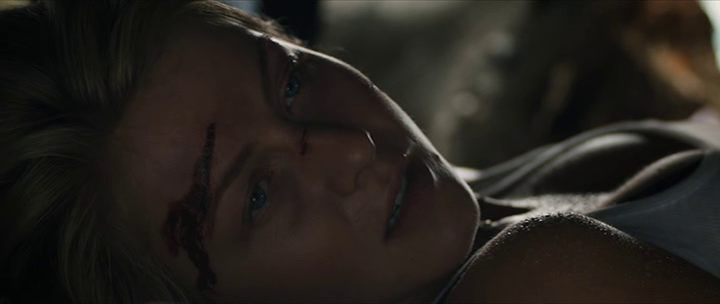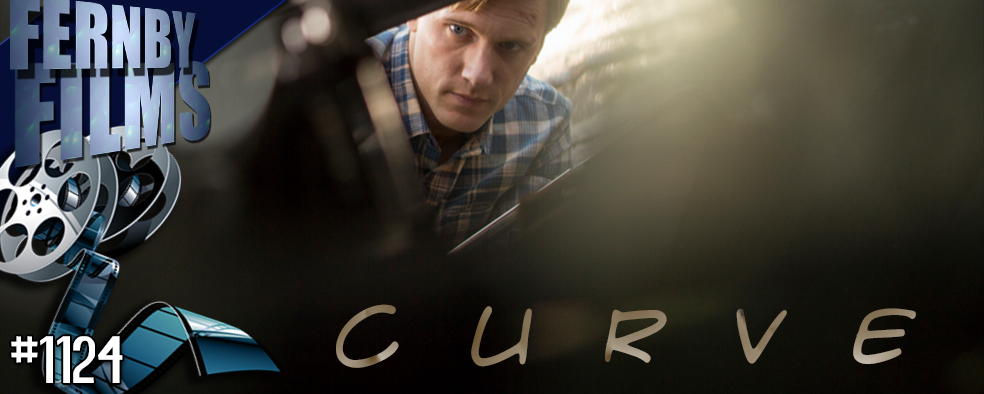Movie Review – Curve
– Summary –
Director : Iain Softley
Year Of Release : 2015
Principal Cast : Julianne Hough, Teddy Sears, Madalyn Horcher, Drew Rausch.
Approx Running Time : 81 Minutes
Synopsis: A young bride-to-be who deliberately crashes her car off a deserted highway in an attempt to escape from a charming, predatory hitchhiker. When the plan backfires, trapping her in an overturned vehicle, she defends herself against a terrorizing psychopath.
**********
Curve is one of those films that works dependent on the quality of the cast – okay, so all films live and die by their casting, but films involving a cast of only a handful automatically bring into focus any limits to an actor’s performance for the length of a feature film. Take Ryan Reynolds’ turn in Buried, a film he carried entirely on his own due to being the only person on the screen. If Reynolds hadn’t pulled that role off, if he’d slipped in any way, the film wouldn’t have worked, at least nowhere near the quality it did. Similarly, films such as Saw, or The Hitcher (a film to which Curve owes a lot of its survivalist narrative) where a small cast have to perform significant amounts of screen time really hang off the ability of their actors to give the audience a journey worth taking. Curve’s relatively simple and menacing premise – seriously, how do hitchhikers even still exist in the modern age? – doesn’t bring much new to the table of thriller films, but thanks to a lovely performance by Julianne Hough, the film’s twisty, pulsating central premise really zings. It’s because of her the film works as well as it does.
 Hough plays Mallory, a bride-t0-be traveling across country (naturally) to be with her groom as they start a new life together. As she drives, we learn that there’s some tension in the relationship, something noticeably prescient as her car breaks down in the middle of nowhere. A stranger appears, Christian (Teddy Sears), who gets her going, and she decides to drop him at a local motel a few towns over by way of payment for his assistance. However, Christian ain’t all he appears; he’s something of a psychopath, and after a momentary panic, Mallory decides to crash the car in order to try and escape. She succeeds, only to find that Christian is also still alive and able to menace her while she’s stuck inside her overturned vehicle. Wounded, unable to call for help, Mallory and Christian begin a deadly game of cat and mouse with her very survival at stake.
Hough plays Mallory, a bride-t0-be traveling across country (naturally) to be with her groom as they start a new life together. As she drives, we learn that there’s some tension in the relationship, something noticeably prescient as her car breaks down in the middle of nowhere. A stranger appears, Christian (Teddy Sears), who gets her going, and she decides to drop him at a local motel a few towns over by way of payment for his assistance. However, Christian ain’t all he appears; he’s something of a psychopath, and after a momentary panic, Mallory decides to crash the car in order to try and escape. She succeeds, only to find that Christian is also still alive and able to menace her while she’s stuck inside her overturned vehicle. Wounded, unable to call for help, Mallory and Christian begin a deadly game of cat and mouse with her very survival at stake.
The ol’ game of cat-and-mouse is a tried and true formula for the thriller genre, a menacing antagonist and a (usually) virginal, or somewhat placid protagonist forced to go above and beyond to escape. Mallory isn’t a particularly idiotic heroine, which makes a refreshing change – she’s flawed in her own sweet way, and Hough’s performance never once makes you roll your eyes thinking how stupid people in these films generally are (finally!) so in this respect Curve is on a road to success already.
Another problem these man-in-box scenarios often encounter is a lack of logic within its own story; too often, a film strives for inventiveness and raising the stakes, at the expense of logic or flat-out common sense. Curve avoids this pitfall too, thankfully. Mallory’s upside-down-in-a-car predicament, trapped for hours with no way to pass the time but think of a way to call for help, or listen to the radio, and contemplate life, might have expanded into a more bloody, fantastical fight for survival that becomes more nihilistic than entertaining. The sense of realism (in spite of Christian’s inherent sadistic tendencies) keeps this film grounded even when the pace slows once the film’s crash occurs.
Hough gives Mallory an internalized sense of duty, of strength within herself even when her back is against the wall, figuratively speaking. Mallory’s character unwraps the further the film goes on, as Christian’s mind games and psychological torture drag on through the hours. Although the script is canny enough to offer restraint in complexity, there’s never a sense that the film will venture beyond being merely a B-movie thriller similar to Kurt Russell’s Breakdown (another film Curve owes its DNA to) but you know, that’s okay. It’s a small-flame film, a film designed to operate in a relatively small space, not occupying vast plot mechanics but rather drawing our attention inwards, to the plight of Mallory as her trauma begins to mount. Curve isn’t a particularly clever film, in that respect, but what it does, it does well.
 Naturally, a film such as this depends greatly on the menace provided by its villain, in this instance a brooding, sadistic Teddy Sears. Sears is better known for his television roles (such as Masters Of Sex, and more recently as Jay Garrick in the second season of The Flash) but brings considerable low-key assholery to the role, as he torments Mallory while she’s stuck at the bottom of a canyon. The chemistry between Hough and Sears, particularly in their opening encounter before Christian goes all psycho, is nice, albeit tempered by her being a bride-to-be, and he being a hunky engine-starting wanderer. Problematically, Christian’s motivation isn’t explained other than the dude’s just an out-and-out psycho, which is cool and all but it’s my opinion the character deserved at least some kind of grounding.
Naturally, a film such as this depends greatly on the menace provided by its villain, in this instance a brooding, sadistic Teddy Sears. Sears is better known for his television roles (such as Masters Of Sex, and more recently as Jay Garrick in the second season of The Flash) but brings considerable low-key assholery to the role, as he torments Mallory while she’s stuck at the bottom of a canyon. The chemistry between Hough and Sears, particularly in their opening encounter before Christian goes all psycho, is nice, albeit tempered by her being a bride-to-be, and he being a hunky engine-starting wanderer. Problematically, Christian’s motivation isn’t explained other than the dude’s just an out-and-out psycho, which is cool and all but it’s my opinion the character deserved at least some kind of grounding.
Curve works simply because there’s people like Christian out there willing to compromise human emotion for vile, cruel psychopathy. This background noise of knowledge adds weight to Curve’s simple story and survival motifs. Also, a past history of news stories where people have been trapped in their car over an embankment right next to a highway, also makes Curve’s central idea all that much captivating and empathetic. Iain Softley, whose work previously includes Backbeat, K-Pax and Hackers, gives the film a dusky sense of melancholy, shying away from vibrant hues in favor of a more muted visual aesthetic. As the stake raise, and Mallory begins her inevitable fightback, Softley gives the film an increased level of impact by refusing to go all hyperkinetic, all flamboyant, when he might easily have done so.
About the only real plot hole I could think of (and yeah, I do try and think of them) is that a psychopath of Christian’s level – he’s killed a half dozen people within the space of this film alone – has obviously has done this kind of thing before, and yet he’s not on any major police watch list, or FBI list, or something? Surely the trail of bodies he’s left has made him some kind of suspect or something, somewhere. But no, apparently he’s free to just wander the backroads of Dustville USA killing off innocent people without anybody’s suspicions being raised. If there’s a fault in the film, it’s probably that.
Although its B-movie plot and lack of A-list stars might render this film a dusty, left-on-the-shelf also-ran, Curve doesn’t deserve such a fate. It’s actually really well made, and if that sounds condescending that isn’t my intent. You’d look at the film’s poster and expect a certain level of story ineptness, a sense of pulp fiction filled with gore or blood or some manner of expected awfulness. Curve isn’t quite that film. It’s actually really rather bloodless in the sense that it’s realistic with what injuries Mallory suffers, but offers virtually no gore-porn to speak of. Eli Roth would be furious. Curve is well worth a watch, not because it’s a film that defies expectations (and it does), but because it’s just a solid, well made little thriller that works on every level you expect.









No thanks.
Julianne Hough.. the reality dancer girl.. really.. who knew?? 🙂
I know, right? She's actually pretty decent!